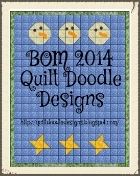A friend of mine who made blocks for the Midnight Sky quilt I worked on asked whether any of her blocks were poorly made--you may remember I told you that a couple were too small, and a few were too large and had to be remade; in remaking them, I couldn't figure out how the person had cut and stitched the pieces for one of the blocks because they were not at all straight or precise. As I told my friend, I had no idea who made which blocks and it didn't really matter anyway; I just thought the subject would be a good learning topic for some of the less experienced quilters who read this blog.
The funny thing is that my friend also told me that since reading that post, she's been paying closer attention to her sewing and trying to be more precise, and that's exactly the purpose of that post--because we can all get better with experience and practice, particularly when we pay attention to what we're doing.
I think at least one person said they had a hard time figuring out where to line up for the quarter inch seam allowance. Most sewing machine manufacturers sell a quarter inch foot for their machine, and there are also generic feet that will fit most machines. Still, it's an expense that not everyone wants to invest in, so there are other ways to get a fairly precise seam allowance.
Below is a close up of my machine--it's a Bernina and it has a quarter inch foot on it.
Besides using the edge of the foot, the plate has markings showing where to line up for a quarter inch seam. See that little line in the metal just to the right of the fabric? But if I had neither of those references, I would use a piece of masking tape or painter's tape to tape off a line I could use as a guide. I would do that by placing an acrylic ruler under the foot with the quarter inch mark lined up with the needle and the edge of the ruler extending a quarter inch to the right. I'd then stick the tape to the plate along the edge of the ruler.
Someone also commented about having trouble cutting width-of-fabric strips so they're straight. Here's the method I was taught. First, press all the wrinkles from your piece of fabric and hold the fabric up with selvage edges lined up as they are in the next photo. (Normally I would hold the fabric, not pin it to a design wall, but I couldn't take photos that way!)
Slide the selvages back and forth until the fabric hangs straight. In the photo above, it's hard to see but the fabric didn't hang straight until I slid the front edge a bit to the left in the photo below.
Most of the time, you can skip this first step if the fabric is properly creased on the bolt. You can usually tell by looking along the selvage edges to see if the are evenly aligned down the length of the fabric. If they are, then chances are the center crease in the fabric is fine.
Often times for cutting, it's easier to double the fabric over once more as in the next photo.
The same process of aligning edges and shifting until the fabric hangs straight is used. I then line up the edge of my ruler along the center fold and make the first cut along the bottom of my ruler to trim the edges. Then, after I've cut the first strip, I unfold it to see if the cut is straight and true before continuing on. I will then usually cut about three more strips before lining up the ruler with the center fold again to reestablish a straight edge because after a few cuts, chances are the fabric and ruler have shifted slightly and the strips are no longer as straight as they should be.
That's all I have for you tonight, and I hope it's helpful to some! Thanks for visiting.













6 comments:
Thanks for the reminder to cut and sew carefully. I know I have problems when I rush and aren't as careful as I should be. My 1/4 foot on my new machine is well worth the extra money!
My machine is a Janome and I have the quarter inch foot but I find I get a dog's hind leg of a seam with it so I use the ordinary foot which has a ridge in it that measures a minimal quarter inch from the needle to the ridge. My friend was having the same trouble and she now does what I do and we both get perfect seams.
I find fabric is rarely put on the bolt evenly and I nearly always have to jiggle the selvedges about to get them even.
Thank you!
Since I bought my magnet my 1/4 inch allowance has gotten much better! I do so love it when you give advice! It is like having my Mother to talk to again! Thank you!!
I always feel my fold(s) if I fold the fabric more than once. If those two folds aren't snugged right up tight to eachother, you will get the dreaded 'v' when you cut your strips. Love your blog! Helen
We've been helping a "newbie" in our quilt quild establishing with her accurate 1/4" seams yet she would phone & tell us that ea block she made although same pattern was a dif size. Finally our group met & the mystery was solved. Yes she did sew very accurate 1/4" seams but the under fabric sometimes shifted & just was not kept lined up with the top fabric while she sewed the seam & quickly pressing to one side would often cover this mistake.
Post a Comment